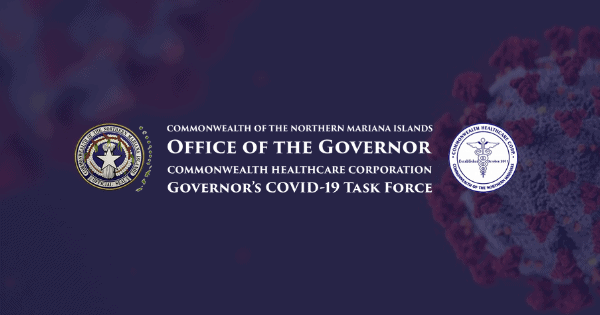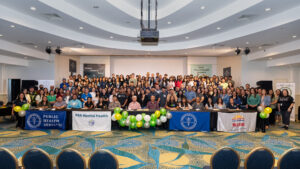The Governor’s COVID-19 Task Force and the Commonwealth Healthcare Corporation (CHCC) announce that the CNMI has adopted the U.S. Centers for Disease Control and Prevention’s (CDC) new COVID-19 metric of Community Levels.
Overview
Since the start of the COVID-19 pandemic, Governor Ralph DLG. Torres issued several executive orders which declared a state of significant emergency and outlined restrictions on activities throughout the Commonwealth in efforts to contain and mitigate the spread of the disease throughout the community.
The CHCC and the Governor’s COVID-19 Task Force implemented protocols that are cognizant of community concerns regarding COVID-19 and administered in a manner that allows for community participation in mitigating the spread of the disease.
With the CNMI’s high percentages of residents completing their primary series of a COVID-19 vaccine or receiving a booster shot, the new CDC metric falls in line with the CNMI’s shift to focus on medically significant community cases.
Focusing on reducing medically significant illness and minimizing strain on the CNMI’s healthcare system reflects the CDC’s current approach to the SARS-CoV-2 infection, immunity from vaccination and prior infection, and the treatments available.
COVID-19 vaccines remain the best protection against severe illness, and ensuring access to vaccines, treatments, and testing remains in the CNMI’s plan with living COVID-19 safe.
New Community Level metric
With the new CDC metric, the CNMI is currently in the High Community Level.
A combination of three factors determines the COVID-19 Community Level:
1. New COVID-19 admissions per 100,000 population in the past 7 days
2. The percent of staffed inpatient beds occupied by COVID-19 patients
3. Total new COVID-19 cases per 100,000 population in the past 7 days
New COVID-19 admissions and the percent of staffed inpatient beds occupied represent the current potential for strain on the health system. Data on new cases acts as an early warning indicator of potential increases in health system strain in the event of a COVID-19 surge.
The COVID-19 Community Level is determined by the higher of the new admissions and inpatient beds metrics, based on the current level of new cases per 100,000 population in the past 7 days.
Based on these factors, the COVID-19 Community Level can be classified as Low, Medium, or High.
To date, cases are continuously detected via Community-Based Testing, CHCC or DFEMS testing, as well as at-home testing. As of March 14, 2022, a total of 10,535 cases of COVID-19 have been reported in the CNMI, with 1 in 5 CNMI citizens estimated to have contracted the disease. Due to the high vaccination rate against COVID-19 in the CNMI and availability of treatments such as monoclonal antibodies, rates of severe COVID-19 have been low. A total of 213 people have been hospitalized for COVID-19 (2.1% of cases) and 31 people have died due to COVID-19 for an overall case fatality rate of 0.3%, lower than almost every other U.S. jurisdiction and most countries.
Recommendations for individual persons and households based on COVID-19 Community Levels:
I. HIGH
a. Wear a well-fitting mask indoors in public, regardless of vaccination status (including in K-12 schools and other indoor community settings)
b. If you are immunocompromised or have a high risk for severe disease:
i. Wear a mask or respirator that provides you with greater protection
ii. Consider avoiding non-essential indoor activities in public where you could be exposed
iii. Talk to your healthcare provider about whether you need to wear a mask and take other precautions (e.g., testing)
iv. Have a plan for rapid testing if needed (e.g., having home tests or know access to testing)
v. Talk to your healthcare provider about whether you are a candidate for treatments like oral antivirals, PrEP, and monoclonal antibodies
c. If you have household or social contact with someone at high risk for severe disease:
i. Consider self-testing to detect infection before contact
ii. Consider wearing a mask when indoors with them
d. Stay up to date with COVID-19 vaccines and boosters
e. Maintain improved ventilation throughout indoor spaces whenever possible
f. Follow CDC recommendations for isolation and quarantine, including getting tested if you are exposed to COVID-19 or have symptoms of COVID-19
II. MEDIUM
a. Wear a mask based on your personal preference, informed by your personal level of risk
b. If you are immunocompromised or have a high risk for severe disease
i. Talk to your healthcare provider about whether you need to wear a mask and take other precautions (e.g., testing)
ii. Have a plan for rapid testing if needed (e.g., having home tests or know access to testing)
iii. Talk to your healthcare provider about whether you are a candidate for treatments like oral antivirals, PrEP, and monoclonal antibodies
c. If you have household or social contact with someone at high risk for severe disease:
i. Consider self-testing to detect infection before contact
ii. Consider wearing a mask when indoors with them
d. Stay up to date with COVID-19 vaccines and boosters
e. Maintain improved ventilation throughout indoor spaces whenever possible
f. Follow CDC recommendations for isolation and quarantine, including getting tested if you are exposed to COVID-19 or have symptoms of COVID-19
III. LOW
a. Wear a mask based on your personal preference, informed by your personal level of risk
b. Stay up to date with COVID-19 vaccines and boosters
c. Maintain improved ventilation throughout indoor spaces whenever possible
d. Follow CDC recommendations for isolation and quarantine, including getting tested if you are exposed to COVID-19 or have symptoms of COVID-19
e. If you are immunocompromised or have a high risk for severe disease
i. Have a plan for rapid testing if needed (e.g., having home tests or access to testing)
ii. Talk to your healthcare provider about whether you are a candidate for treatments like oral antivirals, PrEP, and monoclonal antibodies
COVID-19 Community Levels prevention strategies for the CNMI
Throughout all Community Levels, the CHCC and the Governor’s COVID-19 Task Force will continue to ensure access and equity to COVID-19 vaccination, testing, treatment, community outreach, and support services.
Some community settings such as schools and some high-risk congregate settings such as correctional facilities may include additional layers of prevention (e.g., physical distancing) based on information and data about the characteristics of the setting. High-risk congregate settings may implement added prevention as needed in the event of a facility outbreak even if COVID-19 Community Levels in the surrounding community are low.
Mask-wearing
While the CNMI did not have an official mask mandate, guidance from the CDC, the CHCC, and the Governor’s COVID-19 Task Force emphasized the importance of the 3 W’s including wearing a mask, washing your hands, and watching your distance to mitigate the spread of COVID-19.
In general, residents do not need to wear masks when outdoors.
If you are sick and need to be around others or are caring for someone who has COVID-19, wear a mask.
If you live with or will gather with someone at risk for severe illness, wear a mask when indoors with them.
I. HIGH
a. Wear a well-fitting mask indoors in public, regardless of vaccination status (including in K-12 schools and other indoor community settings)
II. MEDIUM
a. Wear a mask based on your personal preference, informed by your personal level of risk
III. LOW
a. Wear a mask based on your personal preference, informed by your personal level of risk
Indoor/Outdoor Gatherings
Attending a gathering or event increases your chance of being in close contact with people outside your household and being exposed to COVID-19.
Avoid crowded places where you cannot stay 6 feet away from others.
Businesses that serve the public should continue to assist in the CNMI’s effort to stop the spread of COVID-19 by promoting healthy hygiene practices, cleaning and disinfecting surfaces frequently, ensuring proper ventilation throughout its spaces, and monitoring for sickness. Businesses may implement a capacity limit for the safety of customers or staff who expressed they have underlying medical conditions. A guidebook for controlling the spread of COVID-19 in the workplace is available at www.staysafecnmi.com/livecovidsafe.
Consider using a self-test before joining gatherings with others who do not live in your household.
If you come into close contact with someone with COVID-19:
Get tested at least 5 days after your last close contact
Monitor your symptoms
Tell your close contacts that they may have been exposed to COVID-19 so they can quarantine, get tested, and wear a well-fitting mask
Stay home if you test positive, even if you do not have symptoms.
Stay home if you are sick or experiencing symptoms of COVID-19.
If you want to spend time with people who do not live with you, outdoors is the safer choice. You are less likely to be exposed to COVID-19 during outdoor activities, even without the use of masks.
Good ventilation can help prevent you from getting and spreading COVID-19.
Testing positive
If you test positive on any COVID-19 test (Community-Based Testing, DFEMS antigen testing, Koblerville COVID-19 Community Center antigen testing, or at home), stay home for at least five (5) days and isolate from others. After 5 days, you can end isolation but should continue to take precautions and wear a well-fitted mask for an additional 5 days.
Visit www.staysafecnmi.com/self-reporting within 6 days of your test result to obtain your quarantine completion certificate. You will need to upload a photo of your test result or test result documentation. Employers may use this as documentation of their employee’s positive test result. If employers or employees require additional documentation, they must seek documentation from their healthcare provider.
For PCR test results, the CNMI Test Team may be reached at (670) 785-9968, 785-9969, 785-9970, 785-9972, 785-9973, or 287-7571. For Travel Testing, call (670) 287-7571 or 785-9966.
Vaccination
The CHCC and the Governor’s COVID-19 Task Force highly encourage unvaccinated individuals to get vaccinated or get a booster shot against COVID-19 to help prevent severe illness, hospitalization, and death.
Data from small clinical trials show that vaccine effectiveness against COVID-19 infection is waning after the primary series, but protection remains high against severe disease and hospitalization. Get a booster shot when you are eligible to help prevent more serious symptoms and giving COVID-19 to your friends or family.
Register for COVID-19 vaccination at www.vaccinatecnmi.com, or call (670) 682-7468.
Contact information
To obtain general information about the CNMI COVID-19 response, call the Governor’s COVID-19 Task Force Infoline at (670) 488-0211, available every day, 8 a.m. – 8 p.m., or visit www.staysafecnmi.com.
Call CHCC contact tracers to get assessed for monoclonal antibody treatments at (670) 286-1710, 286-1711, 285- 1942, 287-1652, and 287-1683.
For mental health support and coping skills, call (670) 284-0843 or 284-0847, every day, 8:30 a.m. – 3:30 p.m.
The CNMI is reminded to watch out for misinformation and to follow updates directly from the Governor’s COVID-19 Task Force and the CHCC.
Updates from the COVID-19 Task Force and CHCC can be found on Facebook, Instagram, and Twitter accounts @governorcnmi and @cnmichcc, as well as through CNMI media partners.






